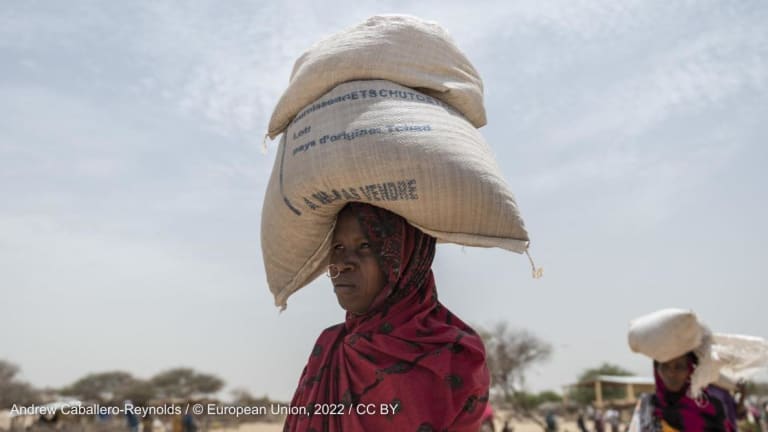
As the United Nations General Assembly drew to a close on Saturday, Sept. 24, world leaders committed a fresh round of donations for the crisis in the Horn of Africa, and vowed to pursue long-term solutions to attain food security in the region and prevent the crisis from happening again.
In the U.N. minisummit on the crisis held on the sidelines of the General Assembly alone, more than $218 million in new pledges have been made by 13 countries, namely Norway, South Korea, Australia, Switzerland, Japan, Ireland, Finland, Italy, Belgium, Russia, Luxembourg, Chile and Hungary.
On the same day, the World Bank announced it is quadrupling the $500 million commitment it made in July for the Horn of Africa crisis.
Following an assessment World Bank experts led in Djibouti, Ethiopia, Kenya, Somali refugee camps and Uganda, the financial institution decided to increase its allocation to $1.88 billion to address both immediate needs and long-term development objectives of the region.
The resources will be allocated over a three-phase response period: $288 million for rapid response in fiscal 2012, $384 million for economic recovery through fiscal 2014 and $1.2 billion for drought resilience in the long term.
Also during the U.N. summit, the U.S. government has announced it will commit an additional $42 million for the East Africa crisis, of which $30 million will be allocated for Somalia.
The fresh round of commitments bring the funding for the Horn of Africa closer to the estimated total funding need of $2.48 billion.
Some 13 million people in Somalia, Kenya, Ethiopia and Djibouti are facing severe food shortages as a result of the prolonged drought. Famine has so far been formally declared in six areas of Somalia. But The New York Times has also reported accounts of widespread rape and violence among refugees in Somalia and Kenya.
Long-term solutions
U.N. Secretary-General Ban Ki-moon called on leaders from more than 60 nations who attended the Sept. 24 minisummit to address the underlying risk factors so that the crisis does not strike again.
Ban highlighted long-term programs in Ethiopia and Kenya, which enabled these countries to evade famine despite also being hit by the drought. He said such initiatives can be replicated in Somalia.
Leaders and aid agencies who attended the summit showed their support for the call to long-term solutions for East Africa through the Charter to End Extreme Hunger, which was also launched during the event.
Kenya’s Prime Minister Raila Odinga was the first senior government official from the region to support the initiative.
The charter, which was drafted by aid agencies and civil society groups, outlines five key actions that governments of rich and poor countries should take to stop widespread starvation as a result of drought, high food prices and conflict. It also called for the emergency response for East Africa to be properly funded and scaled up.
Hard stance on militant groups
Donor response to the crisis in the Horn of Africa has been criticized for being “delayed” and “inadequate.” For Food and Agriculture Organization Director-General Jacques Diouf, this has led to the growth of the number of hungry people in the region by 1.7 million in the past two months, with famine declared in six regions of Somalia and 750,000 people at high risk.
Douf thus called for ”adequate and predictable” financial resources to resolve the crisis in the Horn of Africa.
But for longtime Somalia specialist Ken Menkhaus, the inadequacy of the international response is also because of the absence of political will to take bold diplomatic action to remove impediments to the delivery of aid. As a result, he said the bulk of the assistance can only get as close as the Kenyan border region.
For Menkhaus, the international community should hold a “diplomatic surge” or take a hard line in making militant groups such as al-Shabab accountable for diverting aid.
The al-Shabab said it will be taking about 6,500 Somali families from refugee camps back to their famine-struck villages so that they can plant when the rains come, the BBC reports.
Several trucks full of people have reportedly already left the Baidoa camp. The militant group has said it will provide people with food rations that will last up to a month and seeds for planting. But aid workers in the area were appalled at the move, saying that it was like “putting people affected by the famine on death row.”
Read more:
IFRC Report: Western Aid Agencies Intrusive, Likely to be Unwelcome in Disasters
USAID, PepsiCo, WFP Tie Up for Food Security in Horn of Africa
At UN Assembly: Andrew Mitchell Calls for More Somalia Aid, Launches New Malnutrition Strategy
Read more development aid news online, and subscribe to The Development Newswire to receive top international development headlines from the world’s leading donors, news sources and opinion leaders — emailed to you FREE every business day.




